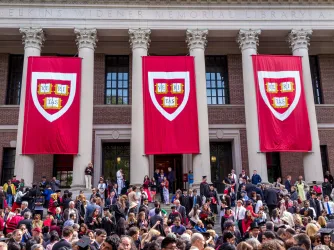Table of Contents
Larry Summers and ‘Academia at Its Worst’
It was disappointing to learn that the University of California (UC) withdrew its speaking invitation to former Harvard president Lawrence H. Summers after the invitations had gone out.
The main pressure appears to have originated with a petition organized by faculty at UC Davis who argued that Summers “has come to symbolize gender and racial prejudice in academia.” His defenders, as well as some of his earlier critics at Harvard, criticized the decision in their remarks to the Harvard Crimson. “To deny him the opportunity to speak is ... academia at its worst,” Harvard professor N. Gregory Mankiw told the Crimson. Besides, for others, Summers has come to symbolize the victim, not the victimizer—the prejudice against free inquiry among faculty who seek to silence certain views.
One of the petition organizers, UC Davis Professor Maureen Stanton, protested that “it wouldn’t reflect well on the university that he even received the invitation.” Instead, it reflects poorly on the university that the invitation was rescinded. Even Tufts University could stomach an invitation to Summers—barely.
Stanton told the San Francisco Chronicle that the swift (and unjust) action against Summers should be swept under the rug: “Frankly, we’d like to see the story just die at this point.” The San Francisco Chronicle (as well as the LA Times and the Sacramento Bee) also points out that this story comes while another California story remains fresh: the rescinded and then reinstated appointment of Erwin Chemerinsky to the deanship of UC Irvine’s new law school. In that case, exposing the injustice to public scrutiny brought some justice for Chemerinsky. Summers deserves an equally public reversal.
What makes this issue even more disappointing is the double standard at UC Davis demonstrated by the faculty who organized the petition. The school’s Principles of Community promise freedom of expression for all ideas—including Summers’s ideas about why relatively few women are succeeding at the highest levels of science:
We affirm the right of freedom of expression within our community and affirm our commitment to the highest standards of civility and decency towards all. We recognize the right of every individual to think and speak as dictated by personal belief, to express any idea, and to disagree with or counter another’s point of view, limited only by university regulations governing time, place and manner.
But in reality, that is too much academic freedom, too much freedom of speech for some UC Davis faculty.
Professor Stanton, a prominent evolutionist, also argued in 2006 that “intelligent design” does not belong in the science classroom (though she acknowledged it was worth discussion elsewhere), because it does not reflect “what scientific inquiry really is,” with “open-minded, unbiased evaluation of evidence”—to quote the report on her public lecture at the time. Larry Summers was being open-minded and unbiased in reflecting on the evidence behind his ideas about women in science. So, why the change of heart?
Recent Articles
FIRE’s award-winning Newsdesk covers the free speech news you need to stay informed.

FIRE POLL: Only 1/4 of Americans support deporting foreigners for pro-Palestinian views

Harvard’s resistance to Trump is a model for US universities

Sixty-one media organizations and press freedom advocates contest Perkins Coie executive order — First Amendment News 466
